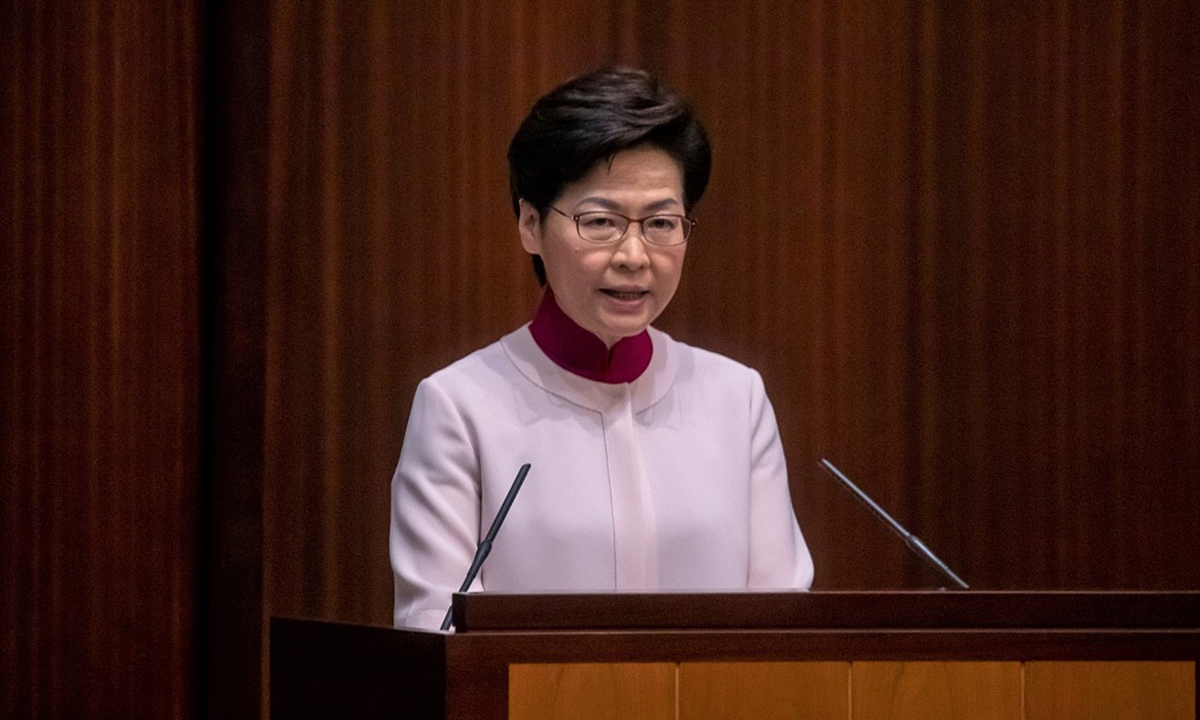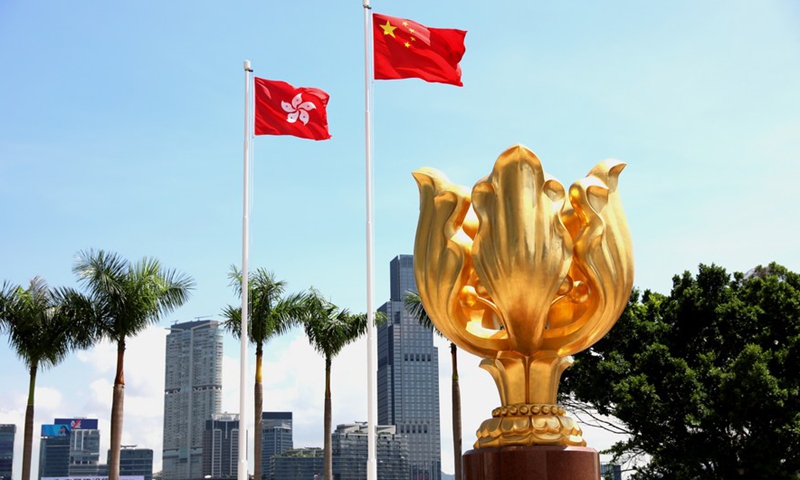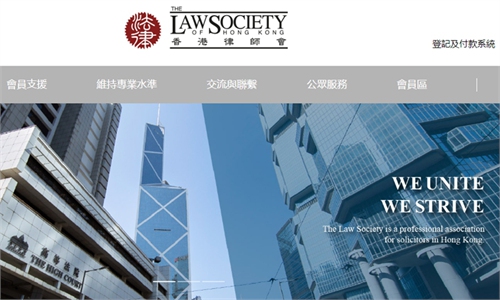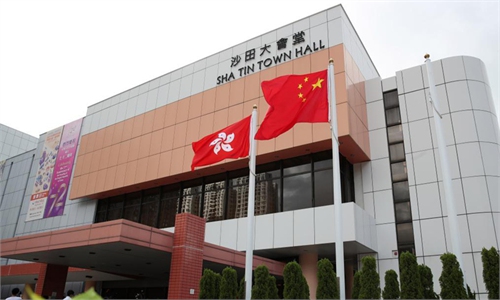
Carrie Lam photo:VCG
Hong Kong Special Administrative Region (HKSAR) Chief Executive Carrie Lam on Wednesday stressed that the city has returned to a right track under the national security law and will "thrive and flourish" under the "one country, two systems," in the final policy address of her tenure that also outlined several major projects and policy initiatives to tackle national security and livelihood issues.
Analysts noted that Lam's policy address focused heavily on the HKSAR's further integration with development of the Chinese mainland and that there is no need to worry about policy continuity, though Lam's term is about to expire.
The policy address was Lam's fifth since she took office and the last one during her tenure. The annual policy address sets out initiatives and policy directives for 2022, which will also mark the 25th anniversary of the city's return to the motherland.
In her 2021 Policy Address, Lam vowed to further improve the implementation of the "one country, two systems" and roll out more measures to help the HKSAR further integrate with development in the Chinese mainland.
Hong Kong has returned to the right track of the "one country, two systems" with the national security law, and governance has returned to normal, Lam said at the opening remarks.
Describing her tenure as the chief executive as the "greatest honor" as well as the "biggest challenge" in her life, an emotional Lam thanked the central government for support in a series of challenges the city faced, including riots, blatant external interferences and the COVID-19 pandemic.
Lam also called on all Hong Kong residents to learn about the "one country, two systems" comprehensively for long-term stability and security and take pride in their identity as Chinese.
Lam said that the HKSAR will actively speed up local legislation of the Article 23 of the HKSAR Basic Law. The government will also strengthen education, adherence and awareness of the national security law among residents, and enhance counter-terrorism efforts. It will also actively strengthen guidance, supervision and management measures concerning national security in schools, social groups, media and the internet.

Photo taken on July 14, 2020 shows the Golden Bauhinia Square in south China's Hong Kong, July 14, 2020. (Xinhua)
Regarding local legislation pursuant to Article 23 of the Basic Law, head of the HKSAR Security Bureau is drawing up plans and provisions based on experience of implementing the national security law and court sentences and preparing measures to prevent secessionists from taking advantage of loopholes across different parts of the society.Lam noted that the HKSAR government will also review and activate existing legislation to ensure that "departments have relevant laws for strict enforcement and investigation on missions involving safeguarding national security."
Based on amendments to the electoral system, the HKSAR will also hold the next two rounds of elections - the seventh Hong Kong Legislative Council election in December and the sixth Hong Kong Chief Executive election next year - "fairly and openly," Lam said.
Lam added that the HKSAR will work to improve civil servants' understanding of the Basic Law and consolidate their ideas of "nation" and safeguarding national security. It will also make arrangements for middle- and high-level civil servants to participate in the research and study of national affairs on the mainland.
In the policy address, Lam also highlighted a plan to develop the HKSAR's 300-square-kilometer northern metropolis near Shenzhen into an international tech innovation and information center. The area, which is set to ease the city's housing woes, will also create more opportunities for deeper cooperation between the HKSAR and Shenzhen, she added.
"The idea of 'twin cities, three circles' between the HKSAR and Shenzhen has been established and will facilitate cooperation between the HKSAR and Shenzhen in areas such as economic development, infrastructure, R&D, livelihood and environment," Lam said, noting that the plan is expected to generate an effect of "one plus one greater than two."
The policy address also proposed a slew of railway connections that further link the HKSAR with Shenzhen, including extending the links to Shenzhen's Qianhai Area.
The robust economic growth and financial opening-up on the Chinese mainland have become the backbone of the development of the HKSAR's financial industry, and Hong Kong's role as a bridge between global capital markets and the mainland will be more evident under the "one country, two systems," Lam said.
According to Lam, the HKSAR is considering allowing the Southbound Stock Connect to be traded in yuan, among a series of other measures to expand the city's role as an offshore yuan trading hub.
In fresh efforts to support livelihood in the city, senior officials of the Liaison Office of the Central People's Government in HKSAR visited various communities in the city and talked with many residents, expressing the central government's care for their housing issues and injecting hope and confidence into their lives.
Lam said in her policy address that the HKSAR plans to use 350 hectares (1.4 square miles) of land to build 330,000 public housing units over the next decade.
Lau Siu-kai, the vice-president of the Chinese Association of Hong Kong and Macao Studies, told the Global Times on Wednesday that many of the measures proposed in Lam's policy address are aimed at further integrating the HKSAR with the development of the mainland, which have received the central government's endorsement.
"Although Lam's term is about to expire, there is no need to worry about policy continuity, because whoever holds the post must fulfill the role assigned in accordance with the country's overall development strategy," he said.
Lau noted that in the past, the HKSAR lacks a long-term development strategy. "The central government will not allow any pause or fault in the process of implementation. In order to better align with the national development strategy, Lam should have had discussion with the central government before delivering her policy address," Lau said.
In the face of the changing international landscape, Hong Kong faces increasing crackdown and exclusion from Western countries and the city needs to find a new development strategy and make full use of the opportunities brought by the national development strategy, Lau said.




